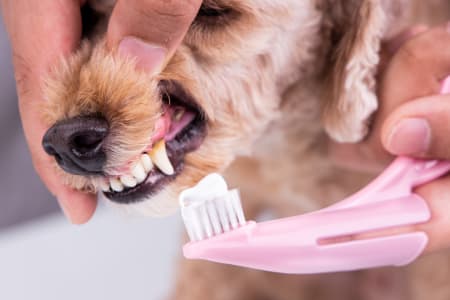What is periodontal disease in dogs?
The bacteria periodontitis can attack your dog’s oral cavity, silently invading the mouth. Your pooch may not exhibit pervasive signs or symptoms until the disease is in its advanced stages.
However, gum disease may cause notable symptoms that can impact the function of your dog’s mouth, not to mention his health: gum erosion, chronic pain and bone or tooth loss may occur. Structures that support the teeth may also be weakened or lost.
Food particles and bacteria can collect along the gum line and when they are not brushed away during a regular tooth brushing, these may develop into plaque, then harden into calculus (tartar).

In turn, this can lead to the first stages of gum disease: inflammation and irritation of the gum line and surrounding areas (a condition also known as gingivitis).
What are the symptoms of periodontal disease in dogs?
Some symptoms of canine periodontitis pooch parents should watch for include:
- Excessive drooling
- Blood in water bowl or on chew toys
- Discolored teeth (yellow or brown)
- Inflamed or bleeding gums
- Bad breath (halitosis)
- Loose or missing teeth
- Weight loss
- “Ropey” or bloody saliva
- Irritability
- Decreased appetite
By the time your dog exhibits symptoms of advanced periodontitis, he could be in significant chronic pain. When this happens, our pets tend to self-isolate out of instinct to prevent showing weakness to predators.
Unfortunately, because our pups’ dental health is linked to their overall physical health, effects of periodontal disease don’t stay confined to the mouth - the condition can eventually cause issues in other major organs and lead to heart disease. This is because bacteria in the mouth can enter the bloodstream and surround the heart.
What are the main causes of periodontal disease?
Inside your pooch’s mouth, bacteria can develop into plaque, which combines with other minerals and hardens into calculus within two to three days. This tartar that forms on the teeth is more difficult to scrape away.
As the immune system fights this buildup of bacteria, reactions such as inflamed gums and more prevalent signs of gum disease can occur.
Poor nutrition and diet can contribute to the development of periodontal disease, as can environmental factors such as grooming habits (does your pup lick himself frequently?), the alignment of teeth (pooches with crowded teeth will be more prone to gum disease), dirty toys, and oral hygiene.
How is periodontal disease in dogs treated?
Costs of dental procedures can vary widely, depending on the level of care your vet prodives, your pet’s requirements, and other factors. Before being put under anesthesia, your pet will need to have blood work done to ensure she’s healthy enough for the medication, which can cause problems for dogs with organ issues.
These items should be included in any dental procedure:
- Complete set of dental radiographs
- Pre-anesthesia blood work
- IV fluids and IV catheter
- Pre-anesthesia blood work
- Endotracheal intubation, inhaled anesthetic and oxygen
- Circulation of warm air to keep pet warm while under anesthesia
- Monitoring while under anesthesia
- Scaling, polishing and lavage of gingival areas
- If any extractions are needed, local anesthesia such as novocaine
- Pain medication during and after procedure
How can I prevent my dog from getting periodontal disease?
Fortunately, we pooch parents can prevent our beloved pets from getting periodontal disease, and the condition can be treated and reversed, if caught in its early stages. When looking after your dog’s oral health, be proactive - don’t neglect it or procrastinate on consulting your vet or scheduling regular appointments.
Similar to their humans, dogs need regular dental checkups to maintain oral hygiene and identify any issues. Your pooch should attend checkups with the vet at least annually to have her oral health assessed. You’ll also have the opportunity to ask any questions you may have about at-home care, and find out how often your pet should attend for professional teeth cleanings (those with issues often need to come more frequently).
Keep problems from developing into unmanageable situations between appointments by brushing your dog’s teeth daily to prevent plaque and bacteria from taking a foothold (don’t forget: choose a toothpaste especially for dogs). Chew toys, special dog food and dental chews designed to address or prevent dental disease and reduce tartar development can also help.
However, be warned that these don’t replace brushing - consider them an add-on to your pet’s regular oral care routine. If you notice swollen or inflamed gums. loose or missing teeth, or decreased appetite, book an appointment immediately.
Note: The advice provided in this post is intended for informational purposes and does not constitute medical advice regarding pets. For an accurate diagnosis of your pet's condition, please make an appointment with your vet.
